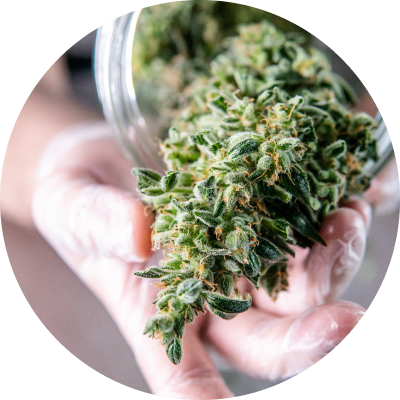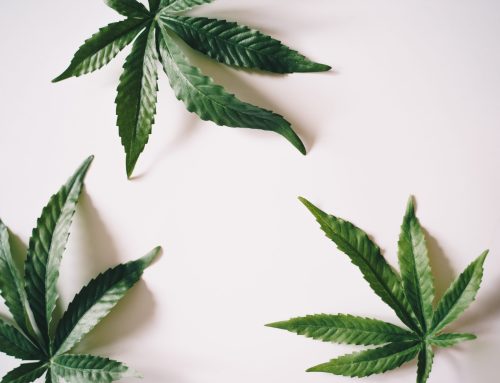ADHD is a mental health disorder that affects millions of people around the world, with many more likely untreated and undiagnosed. Affecting people of all ages, symptoms usually begin to show during childhood, and persist during adulthood. Given the nature of the symptoms, ADHD can drastically impact a person’s quality of life, by causing difficulties related to work, relationships, and mood.
There are, fortunately, treatments for ADHD, many of which revolve around psychiatric medications. And, at the same time, more and more people who have the condition are reporting relief through cannabis use. Cannabis has been used therapeutically for thousands of years, and now, research is catching up, showing the clear effects that the compounds in cannabis can have on those with a host of mental health disorders, ADHD included.
We’re going to share what the growing body of research has to say about cannabis’ effects on ADHD, but we’re also going to take a deeper look into the specific strains of the cannabis plant that are likely the most effective when it comes to addressing the distinctive symptoms of the disorder.
What is ADHD (Attention-Deficit/Hyperactivity Disorder)?
ADHD is a condition that many people don’t even know that they have. For one thing, it’s only been taken seriously very recently, which means that there remain generations of people who have had it their whole lives, before it was a commonly diagnosable disorder. Besides that, the symptoms can range from mild to severe, and many people who have the condition don’t realize that their symptoms reflect a disorder, instead blaming their symptoms on themselves.
Symptoms of ADHD include:
- Disorganization
- Difficulty multi-tasking
- Poor time management skills
- Difficulty with deadlines
- Trouble paying attention
- Trouble completing tasks
- Impulsive behaviors
- Irritability
- Mood swings
- Poor stress management
- Poor anger management
- Excessive physical energy
- Feelings of restlessness
These symptoms can, again, range from mild to severe, and not everyone will have the exact same symptom profile. The bottom line is that ADHD can make it incredibly difficult to live a productive and fulfilling life, which is why it’s important to explore treatment options.
Another thing to keep in mind is that there is a lot of overlap between the symptoms above and other mental health disorders. For instance, people who have depression can also experience chronic feelings of irritability and difficulty concentrating. People who have anxiety can experience mood swings, poor stress management, and feelings of restlessness. This is why it’s important to seek out the help of a medical professional, for an official diagnosis, and a treatment plan that caters to your specific needs.
How is ADHD Treated?
ADHD is commonly treated through prescription drugs. These drugs are formulated to reconfigure cognitive functions in order to help a person focus more effectively, and maintain a more balanced mood, while regulating energy levels. While ADHD is a mental health disorder, traditional forms of therapy, like talk therapy, may not effectively treat the condition itself, because ADHD seems to be related to atypical brain anatomy, which likely requires more advanced care.
However, mood-related symptoms are prevalent in those who have ADHD, and psychotherapy may help address feelings of irritability, impulsiveness, anger, stress, and frustration.
One thing that we want to point out, as this article is ultimately about cannabis, is that if you’re taking medications for ADHD, please talk to your doctor before using cannabis products. Cannabinoids in cannabis may suppress levels of an enzyme called, “CYP3A4”, which is required to metabolize certain medications.
Does Cannabis Help with ADHD?
Cannabis is a genus that encompasses two individual plants commonly used for therapeutic uses: marijuana and hemp. Marijuana is innately psychoactive, due to its naturally high concentration of delta 9 THC, an intoxicating cannabinoid. Hemp, meanwhile, is non-psychoactive, as it produces only trace amounts of THC, and high levels of CBD (cannabidiol), a nonintoxicating yet potentially beneficial cannabinoid.
Despite the fact that each of the two plants has a different level of THC and CBD, the two are extremely similar otherwise in terms of their chemical compositions. Cannabinoids found in cannabis are largely responsible for observed effects on ADHD symptoms. These distinctive plant compounds interact directly with cannabinoid receptors in the brain known as CB1 receptors, which regulate important brain functions, including cognitive functions and the overall support of neural pathways. These cannabinoid receptors belong to the endocannabinoid system, which sends cannabinoids to cannabinoid receptors located all throughout the body, to keep the body in homeostasis.
Studies have even shown positive effects of cannabis on ADHD symptoms. In one study, medical marijuana patients were able to find relief from their symptoms by using cannabis, resulting in an improved ability to focus, self-motivate, and maintain a stable mood.
Although no studies have yet been done on CBD and ADHD, there are studies that clearly demonstrate that cannabidiol can improve overall cognitive function, and has been shown to improve cognition in those who have schizophrenia, which is ultimately classified as a cognitive disorder. Again, ADHD pertains to cognitive functions, and so it’s not surprising that so many people who have ADHD have reported finding relief with cannabidiol. Meanwhile, CBD, along with hemp as a whole, is nonintoxicating, and can therefore act as great options for those who want to use cannabis to achieve relief, but do not want to get high, or are at risk of being drug-tested.
Choosing a Strain for ADHD
Now, let’s get more specific when it comes to addressing ADHD symptoms through cannabis. Many cannabis products, both derived from hemp and marijuana, come in a variety of strains. These products include flower (raw cannabis buds that may or may not be infused with high concentrations of cannabinoid distillates), vaping products, and concentrates, also known as dabs (wax, shatter, sauce, etc.).
The strain of cannabis is the cultivar of the plant, and each strain has a distinctive configuration of both cannabinoids and terpenes. We’ve already covered what cannabinoids are, and the role that they can play in managing ADHD symptoms. But, terpenes may also play an important role.
Terpenes are compounds that, unlike cannabinoids, exist outside of cannabis – in fact, they exist in all plant life. These compounds determine the unique flavor and aroma profiles of each plant species and cultivar. They are also rich in properties that can offer potential benefits, including benefits that pertain to ADHD, like concentration, energy levels, mood, and more.
Cannabis products that come in strains are full spectrum products, meaning that they contain the entire chemical composition of the plant material. This offers synergistic benefits, producing the entourage effect, in which each compound becomes more potentially effective.
There are an estimated 1,000+ strains that exist. And, each one has different dominant cannabinoids and terpenes, which drastically impact how the strain affects the user. Naturally, this means that some strains are more suited for people with ADHD than others, as certain compounds provide more significant effects on the symptoms associated with the disorder.
Which Type of Strain is Best for Those with ADHD?
A cannabis strain can fall into one of three categories:
- Sativa Strains: Are typically more cerebral, and can boost both mental and physical energy, which is why they’re more popular to take during the daytime hours.
- Indica Strains: Are generally more mellowing to the mind and body, and so, are more commonly enjoyed at nighttime. Also frequently yield a stronger body effect, thus, making the muscles feel relaxed and heavy.
- Hybrid Strains: The result of crossing an indica with a sativa, for a more balanced middle-ground experience. You can find indica-dominant hybrids, sativa-dominant hybrids, and 50/50 hybrids.
So, which of these three types of strains is best for someone with ADHD? In fact, there’s no objective answer. Ultimately, each compound in cannabis interacts with each user in a distinctive way. The strain that provides one person with immense relief may be too stimulating or too sedating for another. It’s all about experimenting.
Besides that, there’s a time and a place for each type of strain. For instance, a sativa may help you feel more productive during the daytime, while an indica may help you feel less restless in the evening, when you’re trying to wind down before going to bed.
What are the Best Cannabis Strains for ADHD?
Now, let’s take a look at the specific cannabis strains that are commonly recommended to ADHD patients. Remember that you can find these strains in both hemp and marijuana products.
Sour Diesel
One of the most popular strains of all time, Sour Diesel gets its name from its flavor combination of sour lemons and, well, diesel. Despite its love-it-or-hate-it flavor profile, it can be incredibly useful when it comes to enhancing focus, motivation, creativity, and energy, thanks to its high-sativa orientation and strong concentration of limonene, a stimulating terpene. Sour Diesel is a great daytime option that may help you feel alert, focused, and even in terms of mood.
Pineapple Express
Another all-time classic, Pineapple Express may be something of a misunderstood strain, thanks to its portrayal in an iconic film over a decade ago. Despite what you may believe from the movie, this 60% sativa-dominant hybrid is not nearly as formidable as some think. What Pineapple Express can do is boost mental awareness and focus, while promoting a powerful euphoric effect that can motivate you when you’re feeling down. Its warm and tingly body buzz can also help the body relax, and even feel less restless. Doesn’t hurt that its taste of pineapples is nothing short of glorious.
Blue Dream
Yet another 60% sativa, 40% indica hybrid, Blue Dream is, well, dreamy. Its juicy blueberry-like flavor profile is downright irresistible, but that’s just the tip of the iceberg. What people love about Blue Dream is how it can enhance concentration and creativity, making it great for taking on tasks and seeing them through. It can help you stay focused on what’s in front of you, all while feeling uplifted and even giggly. The body effects, meanwhile, keep your muscles nice and relaxed, so that you can stay put for long periods of time. People also find this strain to be great at minimizing stress, and it’s a surprisingly versatile cultivar, being wonderful for both daytime and nighttime enjoyment.
Gorilla Glue #4
Also known as GG #4, this fan favorite is 60% indica, 40% sativa. Those with ADHD may find that this strain is perfect for evening and nighttime, since its mellowing effect can really help focus the mind and ease the body. If you’re prone to bouts of hyperactivity that interfere with your ability to sit back and unwind, you won’t be disappointed with what this strain has in store. Its flavor is intriguing to say the least, with notes of chocolate, spices, and diesel.
Sunset Sherbet
Another popular nighttime choice among those with ADHD is Sunset Sherbet, a fruity and creamy indica-dominant hybrid that can settle racing thoughts, irritability, and restlessness in the body. If you find that it’s difficult to mellow out after a long day, sit back with this cultivar and allow feelings of ease wash over you, as your tension melts away into the abyss.
Harle-Tsu
Bred specifically for its high CBD content (22%), Harle-Tsu is a thoroughly nonintoxicating strain that is known for boosting mental clarity, awareness, focus, and overall mood. People with ADHD also report feeling a sense of calm in the body that helps them feel less restless and irritable, so that they can simply sit back and engage in their favorite activities.
Green Crack
Green Crack is a sativa-dominant hybrid that really lives up to its name, and easily one of the most popular choices for ADHD in particular. It can deliver an absolutely incomparable boost of energy, focus, creativity, and motivation, that can enable you to multi-task like never before. Its sweet, tropical flavor profile is a nice plus, with strong notes of juicy and sweet mangoes.
What You Need to Keep in Mind
Like we said, playing the “strain game” is all about experimenting with different ones, at different times of day, until you find what works for you, personally. And, how much of a product you take also matters in terms of how you experience the effects of cannabis, so experiment with different serving sizes, starting out with a low amount if you’re a beginner.
Lastly, we want to mention that where you’re buying your products from can make all the difference. We urge you to only buy from reputable, trusted companies that are exclusively dedicated to selling cannabis. And, never buy a product without reading reviews, and looking at third-party lab reports, which come from a state-authorized laboratory, and demonstrate the safety, purity, potency, legal compliance, and authenticity of the product.
Certain Cannabis Strains May Improve ADHD Symptoms
Clearly, through both published research and user experiences that the compounds in cannabis have the potential to help individuals who are struggling with ADHD symptoms in their daily lives. And, it’s also clear that certain strains may be particularly effective at addressing things like poor concentration, restlessness, and irritability.
The key is finding what works for you, as each individual’s needs, not to mention brains, are unique. Because of that, we encourage you to really explore the many cannabis products at GreenLife Remedies, where you can experiment with different cannabinoids, strains, product forms, and more, to work toward getting the relief that you deserve.





